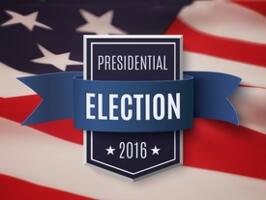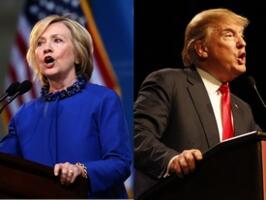Voters See Debate Moderators Giving Clinton A Helping Hand
Voters are pretty convinced the moderators at the presidential debates scheduled to begin tonight will be helping Hillary Clinton more than Donald Trump.
A new Rasmussen Reports national telephone and online survey finds that a plurality (46%) of Likely U.S. Voters believes most moderators will try to help Clinton in the upcoming debates. Only six percent (6%) think they will try to help Trump instead. Just 32% say most of the moderators will try to be unbiased, while 15% are undecided. (To see survey question wording, click here.)
Seventy-eight percent (78%) of voters who support Trump think the moderators will try to help Clinton. Most Clinton supporters (56%) say the moderators will try to be unbiased, but 20% say they’ll try to help their candidate. Twelve percent (12%) of Clinton voters think the moderators will try to help Trump, compared to just two percent (2%) of Trump supporters who feel that way.
Four years ago before the first debate between President Obama and Republican nominee Mitt Romney, 71% of Republicans and 56% of unaffiliated voters said debate moderators are biased, but Democrats by a 47% to 30% margin felt they were not biased. In 2008 before the first debate, 22% felt the first moderator, veteran PBS newsman Jim Lehrer, would try to help Obama, while six percent (6%) expected him to help GOP nominee John McCain. Forty-three percent (43%) though Lehrer would play a neutral role.
This year's debates are potentially a breakaway moment for either Clinton or Trump who have been running neck-and-neck for weeks in Rasmussen Reports' White House Watch survey. Trump is ahead by five points in the latest survey, but it's too early to say if he is gaining any traction over his rival.
(Want a free daily email update? If it's in the news, it's in our polls). Rasmussen Reports updates are also available on Twitter or Facebook.
The survey of 1,000 Likely Voters was conducted on September 20-21, 2016 by Rasmussen Reports. The margin of sampling error is +/- 3 percentage points with a 95% level of confidence. Field work for all Rasmussen Reports surveys is conducted by Pulse Opinion Research, LLC. See methodology.
[Rasmussen Reports analysts Amy Holmes and Fran Coombs are available for interested media. Please call 732-776-9777 ext. 205 for interviews.]
Voters - particularly those within the two major parties - place more importance on the debates this election cycle than they have in past years.
Sixty-nine percent (69%) of Republicans and 45% of voters not affiliated with either major political party think most moderators will try to help Clinton. Half of Democrats (50%) think the moderators will try to be unbiased, but they are also nearly three times as likely to think the moderators will try to help Clinton more than Trump.
Men and voters 40 and older feel more strongly than women and younger voters that Clinton will receive preferential treatment from the debate moderators.
While 48% of whites and 53% of other minority voters think most moderators will try to help Clinton, only 31% of black voters agree.
Voters who say they are likely to watch the debates feel more strongly than those who are unlikely to watch to expect Clinton to get help from the moderators. Among voters who say the debates are more important this year than they have been in previous elections, 49% expect the moderators to help Clinton; 32% expect them to be unbiased, but only seven percent (7%) think they’ll try to help Trump.
As in previous presidential election cycles, voters expect reporters covering political campaigns to help their favorite candidates and think it's far more likely they will help Clinton rather than Trump.
In the fall of 2012, 51% of voters expected most reporters would try to help Barack Obama get reelected, while only nine percent (9%) thought they would be biased in favor of his GOP opponent Mitt Romney. These findings were nearly identical to those just before Election Day in November 2008. At that time, 51% felt most reporters had tried to help Obama win the presidency, while only seven percent (7%) thought they had tried to help Republican candidate John McCain.
Most voters believe the media, not the candidates, are setting the agenda this election season. Voters continue to strongly believe that the media is more interested in controversy than in the issues when it comes to the presidential race.
Additional information from this survey and a full demographic breakdown are available to Platinum Members only.
Please sign up for the Rasmussen Reports daily email update (it’s free) or follow us on Twitter or Facebook. Let us keep you up to date with the latest public opinion news.
The survey of 1,000 Likely Voters was conducted on September 20-21, 2016 by Rasmussen Reports. The margin of sampling error is +/- 3 percentage points with a 95% level of confidence. Field work for all Rasmussen Reports surveys is conducted by Pulse Opinion Research, LLC. See methodology.
Rasmussen Reports is a media company specializing in the collection, publication and distribution of public opinion information.
We conduct public opinion polls on a variety of topics to inform our audience on events in the news and other topics of interest. To ensure editorial control and independence, we pay for the polls ourselves and generate revenue through the sale of subscriptions, sponsorships, and advertising. Nightly polling on politics, business and lifestyle topics provides the content to update the Rasmussen Reports web site many times each day. If it's in the news, it's in our polls. Additionally, the data drives a daily update newsletter and various media outlets across the country.
Some information, including the Rasmussen Reports daily Presidential Tracking Poll and commentaries are available for free to the general public. Subscriptions are available for $4.95 a month or 34.95 a year that provide subscribers with exclusive access to more than 20 stories per week on upcoming elections, consumer confidence, and issues that affect us all. For those who are really into the numbers, Platinum Members can review demographic crosstabs and a full history of our data.
To learn more about our methodology, click here.




